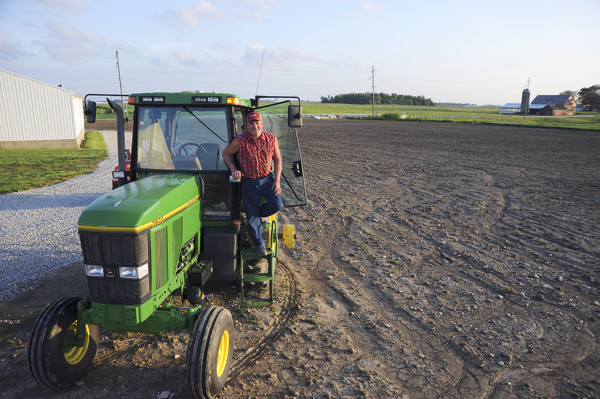Friday, May 31st, 2019
Ongoing rains keeping farmers out of their fields
By Leslie Gartrell

Photo by Dan Melograna/The Daily Standard
Brad Schwieterman surveys his farmland from a tractor on May 23. Like other farmers, Schwieterman has been unable to plant crops due to wet weather.
CELINA - Brad Schwieterman glanced out at his family's field, devoid of crops and still damp from the morning's rain.
Like many farmers in the area, Schwieterman has yet to plant any corn due to the recent heavy rains in the region.
The downpours have kept the lifelong farmer from hauling manure onto the fields and has placed him more than four weeks behind schedule for planting. Schwieterman said he'd normally be done planting by this time of year.
According to the U.S. Department of Agriculture, only 2.7 days were suitable for fieldwork in Ohio during the week ending May 26. Only 11% of the state's soybean crop has been planted, and the state's corn crop isn't much better off; only 22% has been planted. Farmers in Ohio this time last year had 65% of their soybean crop planted and 80% of their corn crop planted.
"The wet weather has done a lot of damage to the wheat and alfalfa crop," Schwieterman added. The USDA backs him up, with reports of failed wheat and alfalfa crops due to saturated soils during the week of May 26.
While there's still time to get crops in the ground, the forecast continues to look bleak. Saturday's forecast forbodes more showers, according to local weatherman and farmer Dennis Howick, leaving little time for farmers to work in their fields.
"It's really put everyone in a bad spot," he said.
Before it's too late, Schwieterman hopes to plant corn, which he feeds to his cows. The next crop he and other farmers are looking to plant will be soybeans, which face a slew of additional problems.
Last year, the U.S. imposed three rounds of tariffs on more than $250 billion worth of Chinese goods. Beijing responded with tariffs on $110 billion of U.S. goods, one of which was soybeans, which has been one of the biggest casualties of the escalating global trade war. China is the world's biggest importer of soybeans, and the U.S. is the second-biggest exporter of the crop.
Some farmers, such as Schwieterman, were hurt by the retaliatory tariffs and received aid from the $12 billion bailout package rolled out by the Trump administration last June.
However, President Donald Trump increased import taxes from 10% to 25% on about $200 billion worth of Chinese products. China announced it will raise tariff rates on $60 billion worth of American products starting June 1.
While the weather is the most pressing issue for farmers, the tariffs also are on their minds. Howick said most farmers with whom he's spoken are more concerned about getting something into the ground while they still can. Yet, the fear lingers that soybeans will dramatically decrease in value as the surplus piles up.
For now, Schwieterman plans to plant corn and hope for the best. He said the farm has been owned by his family since 1853, and he plans to keep it going and pass it on to the next generation.
"We're used to going through hardships," he said. "You've got to have faith."
- The Associated Press contributed to this report.


